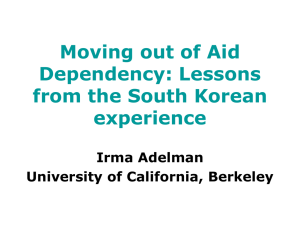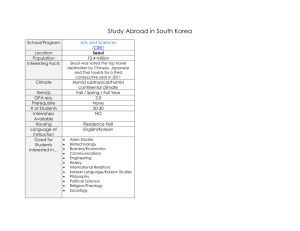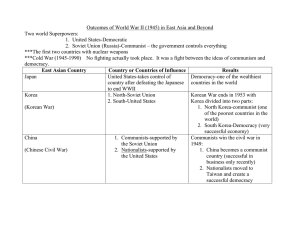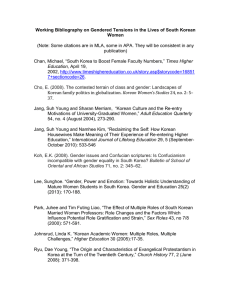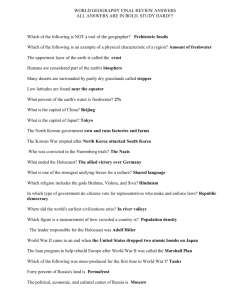Bahrom International Program 2015 Seoul Women’s University, South Korea
advertisement
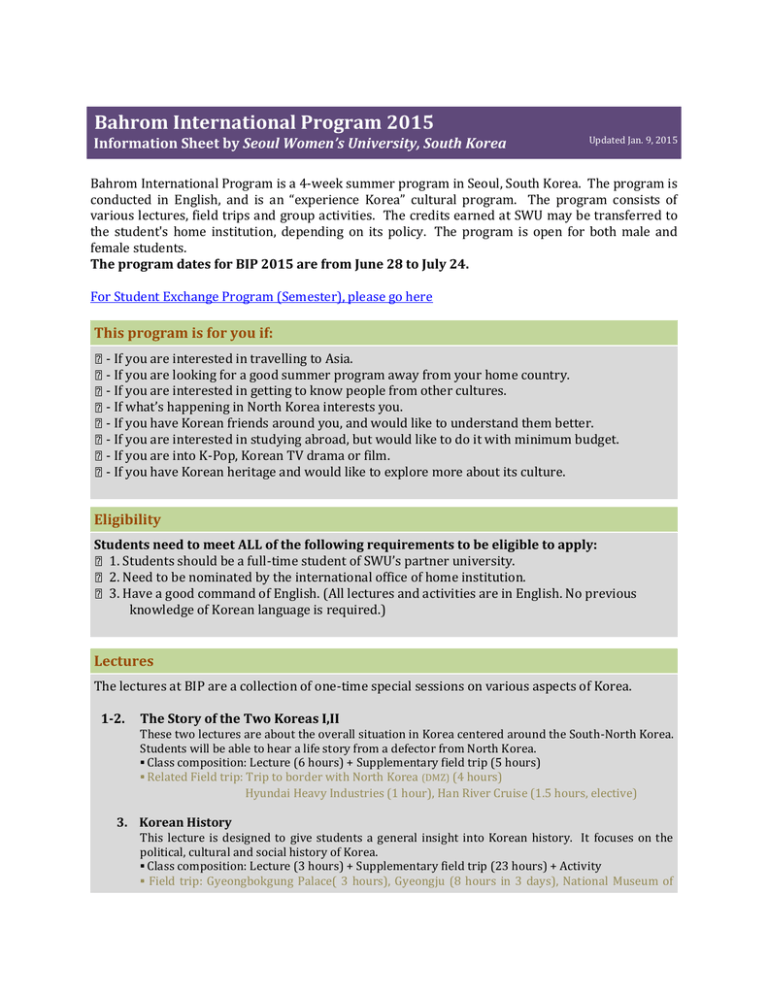
Bahrom International Program 2015 Information Sheet by Seoul Women’s University, South Korea Updated Jan. 9, 2015 Bahrom International Program is a 4-week summer program in Seoul, South Korea. The program is conducted in English, and is an “experience Korea” cultural program. The program consists of various lectures, field trips and group activities. The credits earned at SWU may be transferred to the student's home institution, depending on its policy. The program is open for both male and female students. The program dates for BIP 2015 are from June 28 to July 24. For Student Exchange Program (Semester), please go here This program is for you if: - If you are interested in travelling to Asia. - If you are looking for a good summer program away from your home country. - If you are interested in getting to know people from other cultures. - If what’s happening in North Korea interests you. - If you have Korean friends around you, and would like to understand them better. - If you are interested in studying abroad, but would like to do it with minimum budget. - If you are into K-Pop, Korean TV drama or film. - If you have Korean heritage and would like to explore more about its culture. Eligibility Students need to meet ALL of the following requirements to be eligible to apply: 1. Students should be a full-time student of SWU’s partner university. 2. Need to be nominated by the international office of home institution. 3. Have a good command of English. (All lectures and activities are in English. No previous knowledge of Korean language is required.) Lectures The lectures at BIP are a collection of one-time special sessions on various aspects of Korea. 1-2. The Story of the Two Koreas I,II These two lectures are about the overall situation in Korea centered around the South-North Korea. Students will be able to hear a life story from a defector from North Korea. ▪ Class composition: Lecture (6 hours) + Supplementary field trip (5 hours) ▪ Related Field trip: Trip to border with North Korea (DMZ) (4 hours) Hyundai Heavy Industries (1 hour), Han River Cruise (1.5 hours, elective) 3. Korean History This lecture is designed to give students a general insight into Korean history. It focuses on the political, cultural and social history of Korea. ▪ Class composition: Lecture (3 hours) + Supplementary field trip (23 hours) + Activity ▪ Field trip: Gyeongbokgung Palace( 3 hours), Gyeongju (8 hours in 3 days), National Museum of Korea (3 hours, elective), Icheon Pottery Village (3 hours), Taekwondo (3 hours), Korean Folk Village (3 hours) 4. Korean Language This lecture concentrates on teaching students the essential practical language necessary to get around in Seoul, supplemented by the lecture on the language itself and Korean alphabet. ▪ Class composition: Lecture (3 hours) ▪ Activity: Natural exposure to Korean language, especially the interaction with Korean roommates. 5. Contemporary Korean Society Korea has undergone a very rapid economic growth from one of the world’s poorest country to 11th largest economy within 50 years. This lecture will view its impact on Korean society, from the change of family to social inequity and its shift towards multicultural society. ▪ Class composition: Lecture (3 hours) ▪ Field trip: Students will have a chance to do homestay at one of Korean students’ home. (2 days) 6. Korean Dance This lecture will allow students to learn about the basic steps of Korean dance. Students will also be able to watch a live dance performance in the auditorium. ▪ Class composition: Lecture & Practice (3 hours) 7. Korean Costume Students will be given a lecture on the history of Korean clothing, followed by a great opportunity to actually try on Korean traditional costume, Hanbok. With Hanbok on, students will also learn about different types of traditional Korean formal salutation; bows. ▪ Class composition: Lecture (1 hour) + Activity (2 hours) ▪ Activity: Try on Hanbok from many different eras of Korean history. (2 hours) 8. Korean Food Students will learn about Korean dishes, both in theory and through practice. ▪ Class composition: Lecture (1 hour) + Practice (2 hours) ▪ Practice content: bibimbap or japchae ▪ Also during the field trip to Gyeongju, the students will have a chance to experience the typical higher-class Korean traditional table and the middle-class traditional table. 9. Korean Film This lecture will briefly survey the rise of Korea’s film industry from early-mid 20th Century to present. Selected scenes from representative Korean films will be presented to show the characteristics and development of Korean film. ▪ Class composition: Lecture (3 hours) + Watch 2 Korean films (appx. 4 hours) ▪ Korean Films: Joint Security Area(110 minutes) , The Host(119 minutes) (The Host can be replaced with another Korean movie) 10. Korean Economics This lecture will focus on the economic development of Korea, beginning with Korean War up to present-day Korea. The lectures deal with the development of Korea into a major industrial power, the economic crisis that resulted in the aid from IMF, and conclude with an analysis of the current position of Korea in the world. ▪ Class composition: Lecture (6 hours) + Supplementary field trip (2.5 hour) ▪ Field trip: Hyundai Heavy Industries (1 hour), Han River Cruise (1.5 hours) 11. Korean Music This lecture aims to provide a general introduction to the history of Korean music. Students will also be given a chance to view Korean traditional instruments and their performance. ▪ Class composition: Lecture (3 hours) + Activity(2 hours) + Watch performance (3 hours) ▪ Activity: Learn Korean traditional instruments (2 hours) ▪ Performance: Watch NANTA Performance (2 hours) Watch K-pop series (1 hour) Please note that the content of the lecture may change depending on the guest speaker. Field Trip, Activity & Performance Unless marked *elective, these events are part of the program, and everyone is expected to participate. These may be changed or cancelled on occasion of rain or in inevitable circumstances. 1. Trip to the border between North & South Korea: This trip to the 2nd Infiltration Tunnel 2. Gyeongbokgung Palace: Royal Palace during Joseon Dynasty(1392-1910) Can be replaced with 3. Gyeongju: Three-day long trip to this ancient capital of Silla Dynasty(57 BC – AD 918) will 4. Icheon Pottery Village: Students will be able to try out Korea’s traditional pottery-making. 5. Korean Folk Village: This trip will show students how Koreans in the past lived, with restored 6. National Museum of Korea: The Korean central museum holds the greatest treasures of 7. Hyundai Heavy Industries: Hyundai Heavy Industries is the No.1 shipbuilding company in the 8. Taekwondo: The famous Korean martial arts will be shown to the students, giving them also the 9. NANTA Performance: The performance, also shown at Broadway, will show a contemporary and Peace Observatory, located at the border with North Korea, is going to provide students an opportunity to watch with their bare eyes the reality of the remnant of the Cold War. Changdeokgung Palace, another royal palace, without prior notice. broaden your scope to Korea’s culture. buildings and surroundings. Korean history. world for years. Watching the shipyards under the guidance of HHI crew will enable you to get a glimpse of the economic development of Korea in the past decades. opportunity to try out a few moves themselves. fusion-version of Korean traditional percussion 10. Homestay: There will be a chance to stay one night at Korean students’ homes in the second weekend. 11. *elective Namsan N Tower, Bukchon Hanok Village: These are famous tourist attractions in Seoul. Namsan is the mountain that is centrally located in Seoul, upon which N Tower sits on its pinnacle. It boasts a good night view of Seoul. Bukchon Hanok Village also located in the downtown Seoul, and is one of the few places left where Hanok, Korean traditional houses, form a village. 12. *elective Han River Cruise: Han River holds a crucial importance in Korean history. All students will take a cruise on this river that flows the heart of Seoul and appreciate the beautiful night scenery. 13. *elective K-POP Dance: Remember Gangnam Style? You will have a chance to learn and practice one of the dance routines of K-Pop Music. Academics Evaluation 15% Attendance 30% Group Paper (3 group papers after group discussion: 10% each) 30% Individual Term Paper 25% Group Presentation There may be a minor change with regards to the grading policy, in which case students will be informed during the orientation upon arrival in Korea. Living Environment Housing: Bahrom Education Center - Bahrom Education Center(BEC) is the designated housing for the international students. - Suite style room: In each unit, there is a common area in the middle and from there are connected a shower room, two toilets, two sinks and four smaller rooms. Each room will be shared by 2~3 students. There will be at least one Korean student and one international student in one room. Each unit is fully air-conditioned. - High-speed wi-fi is accessible in each room, as well as common areas in the building. - Laundry room is on the 3th,4th,5th and 8th floor. - Dining Hall is on the 2nd floor of BEC. All three meals are served unless informed otherwise. - There is a computer lab on the 7th floor. - A prayer room is also on the 7th floor, for those who want to have a private time for morning devotional. - There is a strict 11pm curfew and headcount. In accordance with Seoul Women’s University’s policy, staying out is not allowed, except for homestay/free weekends. To view photos of BEC, please refer to our Facebook page here. Cost This program is almost free. - Since this program is run as an exchange program, the tuition for this program is waived for international students. - Room(housing) & board(meal)are also waived. There are several meals throughout the program that are out of this coverage. - Transportation from/to the airport is also provided free of charge, if you arrive/depart on the designated day. - These are the things you need to provide on your own: Airfare, health insurance, some stipend to get around in Seoul, fees for elective programs, and USD300 registration fee. - It normally costs KRW1,150~1,300 (appx. USD 1.00~1.25) for one-way trip in Seoul by subway and/or bus. - A non-refundable USD300 registration fee. Please refer to the “Application” section below to see the details of the payment. Visa You do not need to get a student visa to participate in BIP program, as the length of the program is only one month. A general(tourist) visa is enough to participate in BIP. There are, however, many countries whose citizens are waived from visa for tourist entry. The U.S. citizens, as well as Hong Kong, German, Japanese, British and French nationals may stay in Korea without visa up to 90 days. Those who would like to stay in Korea for longer than 90 days will have to contact Korean embassy for visa. Visa is also waived for Canadian and New Zealand citizens, up to 180 days. Chinese and Russian citizens, however, need to get a visa (C-3) that grants 90-day permission for stay. You will need to bring the Letter of Acceptance issued by SWU to local Korean Consulate to get a visa. Also refer to the embassy website to take a look at several cases that allow visa exemption. For the countries not listed here, please check with your study abroad adviser or us. - Korean Embassy in Canada: http://can-ottawa.mofat.go.kr - Korean Embassy in China: http://chn.mofa.go.kr/korean/as/chn/main/index.jsp - Korean Embassy in France : http://fra.mofat.go.kr/languages/eu/fra/main/index.jsp - Korean Embassy in Germany: http://deu.mofat.go.kr/languages/eu/deu/main/index.jsp - Korean Embassy in Japan: http://jpn-tokyo.mofat.go.kr - Korean Embassy in New Zealand : http://nzl-wellington.mofat.go.kr/index.jsp - Korean Embassy in Russia: http://www.infokorea.ru - Korean Embassy in U.K: http://gbr.mofat.go.kr/eng/eu/gbr/main/index.jsp - Korean Embassy in U.S: http://www.koreaembassy.org Application Application Deadline for BIP 2015 is February 20, 2015 - The deadline at your home institution will be sooner than this. Do check with your study abroad/international office. - The application must be submitted to SWU from the international office of your home institution, NOT from the individual student(s). - The electronic version of the application (scanned or MS Word format) may be accepted to save your spot. The original documents and the registration fee will be required to confirm your admission. Application Materials 1. Completed BIP Application (Download or at the last page of BIP brochure) 2. Homestay Questionnaire (at the 2nd page of the BIP Application) 3. 2 photos, including the one on the BIP Application. 4. Copy of Passport (May be submitted by April 30, 2015) 5. Non-Refundable Registration Fee of USD 300 Method of Payment There have been some changes to this policy effective 2014, so please pay special attention to the Method of Payment. There are two ways to pay for BIP Registration Fee: 1. Submit International Money Order with your application. - U.S. Postal Money Order is not accepted in Korea. Personal Check or Traveler’s Check is not accepted. 2. Wire your payment to the following recipient: Bank: Woori Bank Branch: Seoul Women’s Univ. Sub. Beneficiary: Seoul Women’s University Account #: 1005-801-220276 Swift code: HVBKKRSE Please make sure to wire the payment on or after March 1st, 2014, as SWU’s fiscal year renews as of March every year. Please note that payment by cash is no longer accepted. Other Information Weather - In July, the average temperature is 22°C (72°F) in the morning, and 29°C (84°F) during the daytime. - Usually it’s the monsoon season during BIP. It means a few days of raining and then a few days of clear day; it will be humid. Currency - Currency used in Korea is Korean Won (KRW). US$1 is roughly equivalent to KRW 1,000. (Usually between 1,000 and 1,100) Point of Contact - The person in charge of BIP is Mr. Wonjin Joey Yoo at bip@swu.ac.kr, and +82-2-970-5143. - The mailing address is: Division of International Relations Seoul Women’s University 621 Hwarang-no Nowon-gu, Seoul 139-774, Republic of Korea Past BIP photos - The photos from previous years may be seen at the following websites: 1. BIP 2014: https://www.facebook.com/BIP2014 2. BIP 2013: https://www.facebook.com/Bip2013 3. BIP 2012: https://www.facebook.com/groups/490366710977752/photos/
